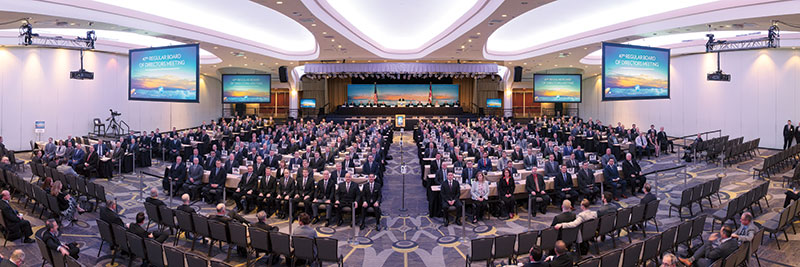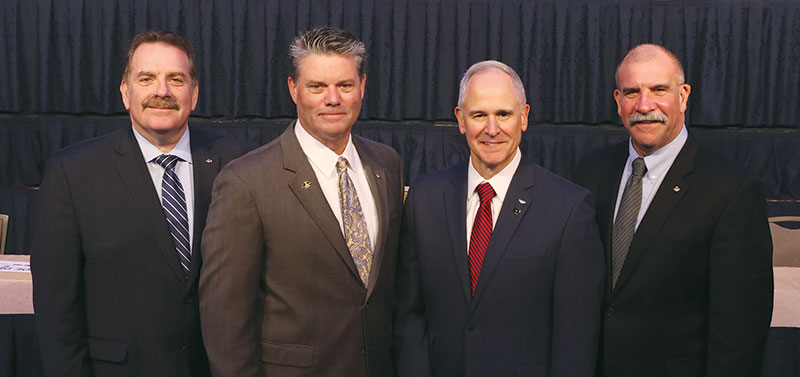47th ALPA Board of Directors Convenes
Elects New Officers, Reduces Member Dues Rate
By John Perkinson, Senior Staff Writer

ALPA’s Board of Directors delegates gather in Washington, D.C., to discuss issues important to the Association and its members.
Every two years, ALPA’s highest governing body meets to consider, discuss, and decide on items that impact the future of the Association. ALPA’s 47th Board of Directors (BOD) meeting proved to be one of action and a signal for change. Two noteworthy actions included national officer elections and a dues reduction.
National officer reports
The BOD meeting opened with reports from ALPA’s four national officers.
“Since 2015, we’ve signed major new contracts at 15 of our pilot groups,” said Capt. Tim Canoll, ALPA’s president, highlighting the union’s recent collective bargaining accomplishments. “We’ve also negotiated dozens of side agreements that advance our members’ goals. I feel extremely proud of your success in collective bargaining—and I know you do, too.”
As part of his presentation, Canoll talked about the numerous advancements and protections ALPA was able to secure in the latest FAA reauthorization bill, including maintaining pilot training, qualification, and experience requirements as well as two fully qualified pilots in the cockpit of every passenger and cargo aircraft (see “ALPA Produces Wins in Landmark Aviation Safety Law”). The FAA Reauthorization Act of 2018, signed by President Donald Trump, reauthorizes the FAA and other programs through the end of Fiscal Year 2023. “Our members raised their collective voice in the corridors of Congress and sent our message in more than 100,000 e-mails, letters, and visits to lawmakers urging them to hold the line on safety. This, along with your social media posts, shattered every ALPA advocacy engagement record,” he noted.
Capt. Joe DePete, ALPA’s first vice president and national safety coordinator, briefed the BOD on the outstanding work of the Air Safety Organization (ASO), acknowledging the more than 425 pilot representatives from Canada and the United States “who are the heart and soul of the ASO.” Among the ASO’s many accomplishments, he recognized ALPA’s work with the Commercial Aviation Safety Team and the Aviation Safety Information Analysis and Sharing System. “As part of this unparalleled collaboration between government and industry to improve aviation safety, we’ve exceeded our initial goal and were successful in reducing the U.S. Part 121 commercial passenger and cargo aviation fatality risk by 83 percent,” acknowledged DePete. “Now our goal is to make aviation even safer by cutting the remaining risk in half by 2025.”
Capt. Bill Couette, ALPA’s vice president–administration/secretary, highlighted the Association’s growth during the last decade, which includes 13 new pilot groups and an increase of nearly 8,000 pilots. He applauded the achievements of the many national organizations and committees he supports, including the Education Committee. “In the last 10 years, we established 11 collegiate outreach programs, which offer mentoring and professional development services,” adding, “Our union makes contact with thousands of students in the United States and Canada each year, and we’ve been doing this for more than 30 years.” He also talked about the recent completion of Project AMBER, the infrastructure-improvement effort to modernize and streamline ALPA’s logistics and operations, observing, “Through our system of governance and committee structure, ALPA is constantly looking at ways to solve problems and improve the lives of our members.”
Capt. Randy Helling, ALPA’s vice president–finance/treasurer, told attendees, “The finances of your union are on solid ground. As you’ll see today with my presentation, our trajectory as an Association remains focused upward—even while we’re able to recapitalize many important assets and resources.” He noted how dues money is used to support ALPA members through various activities and campaigns, referencing the Association’s “Trained for Life” public-awareness campaign. “That phrase is just as relevant across government, industry, and in all your master executive council [MEC] and [local executive council] meetings as it is on the flight deck,” said Helling. “Our sound financial actions aren’t just for when things are going bad; we need to continue on the same path when things are going well, too, so that we’re prepared to meet future challenges.”
Elections
During this year’s BOD meeting, officer elections were held, and the Association’s status reps elected DePete ALPA’s 11th president. “The members of this Association have spoken loud and clear in support of unity, and I look forward to serving every one of our 61,000 pilots across North America,” said DePete. “Together, we’ll continue to build on the decades of advancements we’ve made to our profession, as well as advance aviation safety and security for the future.”
Capt. Bob Fox (United), a former MEC vice chair for his pilot group and a current member of United’s Alliance and Scope Oversight Committee, was elected first vice president. Couette was reelected to his fourth consecutive term as vice president–administration/secretary. Capt. Joseph Genovese (United), his pilot group’s executive administrator and a former MEC secretary-treasurer, was elected vice president–finance/treasurer. Each will serve a four-year term beginning Jan. 1, 2019.

ALPA’s new slate of national officers. From left, vice president–finance/treasurer Capt. Joseph Genovese (United), first vice president Capt. Bob Fox (United), president Capt. Joe DePete (FedEx Express), and vice president–administration/secretary Capt. Bill Couette (Envoy Air).
Union business
The BOD acted on 16 agenda items, including accepting reports from the Association’s national committees. Following much deliberation, BOD members approved a reduction in the dues rate from 1.9 percent to 1.85 percent. The dues reduction becomes effective Jan. 1, 2020, and will be ALPA’s second dues decrease in six years. The Association previously dropped its dues rate from 1.95 percent to 1.9 percent in January 2014.
The BOD also approved changes to the budgeting process to mitigate the effects of the dues reduction on some smaller MECs. The new policy provides that certain MECs will receive payments from the union’s Operating Contingency Fund.
BOD members approved a resolution amending Article III, Section 3.G, of the Constitution and By-Laws, which allows a member attending a local council meeting to provide a “departure” proxy if he or she needs to leave before the meeting has concluded. This amendment takes effect March 1, 2019.
In addition, the BOD authorized amending Constitution and By-Laws Article I and III, and Administrative Manual, Section 90, to allow for an Internet-based system to submit local council representative and officer nominations in lieu of the current paper mail-in ballots. The new nomination process will be implemented for regular cycle nominations for local councils with terms of office beginning March 1, 2020.
BOD members updated Constitution and By-Laws Article XX and Administrative Manual Section 85, revising ALPA policy to specify that airline flight crews must consist of at least two fully qualified pilots and additional pilots for longer flights. (The Executive Board previously authorized the full force of the Association’s resources to combat any regulatory attempts to decrease crew complement/augmentation.)
Recognizing that ALPA is moving closer to a possible merger with the Air Canada Pilots Association (ACPA), which represents the 3,900 pilots who fly for Air Canada and Air Canada Rouge, the BOD conditionally approved several changes necessary to accommodate the merger. The BOD approved the inclusion of larger Canadian airlines into Group A pilot groups for the purposes of electing executive vice presidents, clarified that the financial qualification for Group A status would be calculated by reference to the home currency (Canadian or U.S. dollars) of the MEC, separated the office of ALPA Canada president from the office of Group C executive vice president, and allowed roll-call voting at ALPA Canada Board meetings. Those changes will go into effect if the merger with ACPA is finally approved by the Executive Board or the BOD.
Canoll also recognized that more than 12,100 ALPA pilots have donated $4.1 million to ALPA-PAC for the 2018 election cycle, a tremendous milestone for the Association. He acknowledged the 18 MECs with 100 percent officer participation and the members of this year’s Key Men Society, spotlighting 24 local councils with 100 percent PAC participation among their elected leaders. Although facing stiff competition from Delta and United, the pilots of Hawaiian Airlines were awarded the J.J. O’Donnell Trophy for Political Excellence, which recognizes the pilot group that led the Association in contributions and commitment to ALPA-PAC over the past year.
Strategic planning
When not in plenary, the members of the BOD were divided among eight delegate committees to work on their assigned agenda items and corresponding section of the strategic plan. The key areas of focus included stewardship; excellence and expertise; safety, security, pilot assistance, and jumpseat; content and engagement; pilot representation; growth; the future of the profession; and direct member services.
In preparation for these sessions, ALPA’s Strategic Planning Committee (SPC) provided the BOD with a comprehensive report on the 2016 strategic plan accomplishments prior to the meeting (see “ALPA’s Strategic Plan: Two Years of Substantial Progress”). The SPC also solicited feedback from ALPA’s governing bodies, national officers, MECs, national committee chairs, staff directors, and other subject-matter experts on the recommended course covering the next two years.
At the BOD meeting, each delegate committee thoroughly discussed the goal, objectives, and initiatives for its assigned area. Committees also had at least one interactive panel presentation that enhanced the strategic planning process by enabling delegates to engage in more meaningful dialogue on substantive issues.
On the final day of the BOD meeting, the eight delegate committee chairs reported in plenary on the scope of their discussions as well as the recommendations of their committees. The full BOD reviewed the information and unanimously adopted the 2018 strategic plan.
Who Makes Up the BOD?
More than 200 elected local council status reps make up the Board of Directors (BOD), ALPA’s highest governing body. (The Association’s national officers, executive vice presidents, and master executive council chairs are ex officio members.) They represent 61,000-plus members in the United States and Canada.
Class of 2019: Executive Vice Presidents
ALPA’s Board of Directors elected the following nine executive vice presidents, who will serve two-year terms beginning Jan. 1, 2019.

From left, Capt. Joe Youngerman (Alaska), Group A; Capt. Andrew Massey (Delta), Group A; Capt. Wes Reed (FedEx Express), Group A; Capt. Wes Clapper (JetBlue), Group A; F/O Mike Hamilton (United), Group A; Capt. Sean Creed (Spirit), Group B-1; F/O Tyler Hawkins (Frontier), Group B-2; Capt. James Johnson (Endeavor Air), Group B-3; and Capt. Tim Perry (WestJet), Group C.
ALPA Canada Board Elections
During ALPA’s Board of Directors meeting, Capt. Tim Perry (WestJet) was elected ALPA Canada president. In addition to this position, Perry will also serve as one of ALPA’s executive vice presidents and a member of the Association’s Executive Council. His responsibilities will include planning, coordinating, and administering ALPA Canada activities and initiatives that further ALPA’s strategic goals with the Canadian government and stakeholders. Capt. Brian Shury (Jazz Aviation) was reelected ALPA Canada vice president/International Federation of Air Line Pilots’ Association director, and Capt. Rod Lypchuk (Jazz Aviation) was reelected ALPA Canada vice president–administration/finance. Their terms begin on Jan. 1, 2019.

From left, Capt. Tim Perry (WestJet), Capt. Brian Shury (Jazz Aviation), and Capt. Rod Lypchuk (Jazz Aviation).

